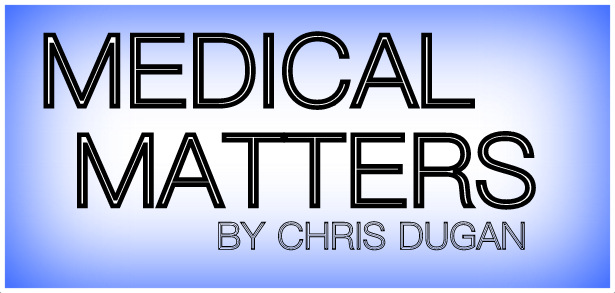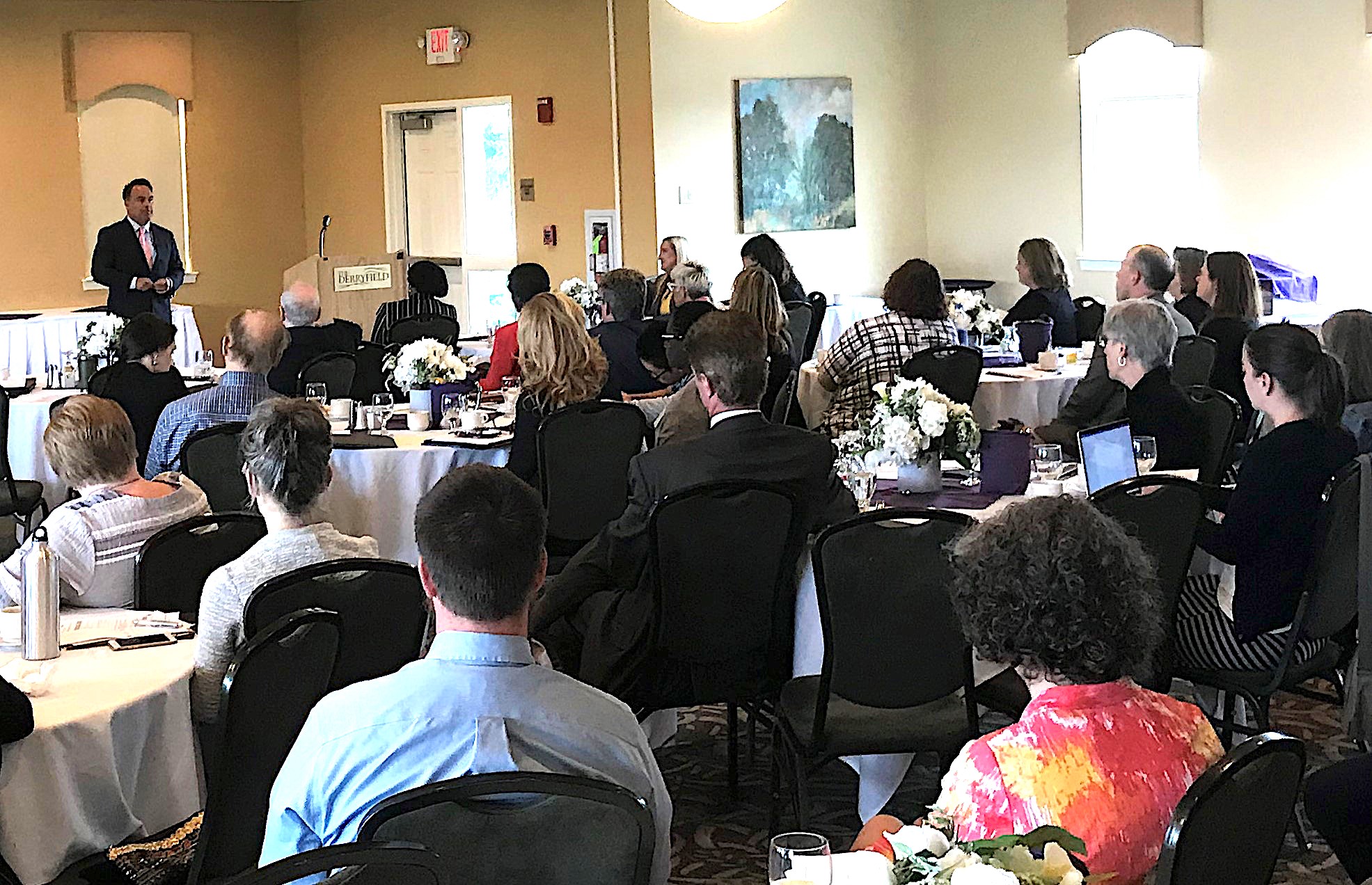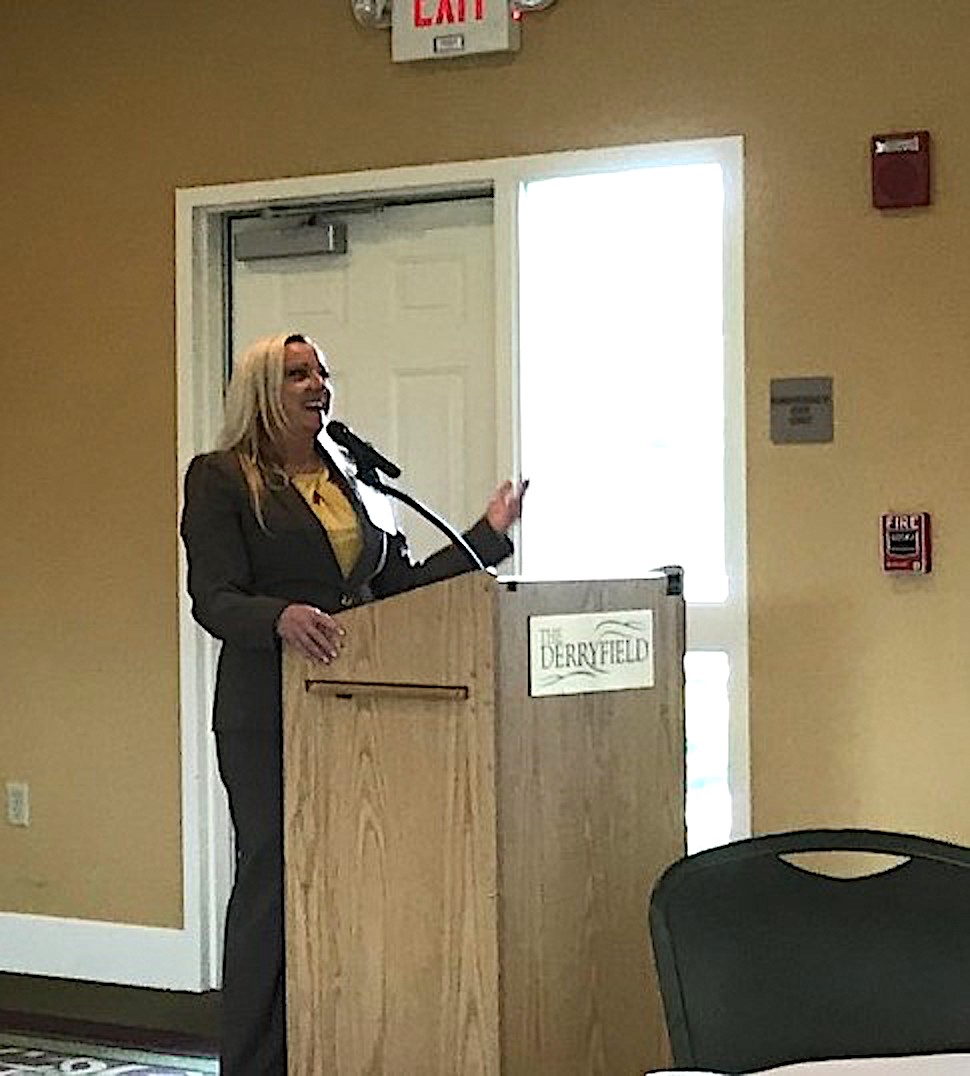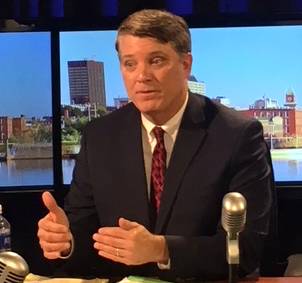

MANCHESTER, NH – As she kicked off an event for business and community leaders on the future of a healthier Manchester, Mayor Joyce Craig on Tuesday spoke of the city’s spirit and energy when facing challenges. This turned out to be a popular sentiment over the next three hours among the audience of over 100 leaders and advocates from the area’s business, law enforcement, health care, government and non-profit sectors.
Entitled “How can community investors help create neighborhoods of opportunity throughout the city of Manchester,” the conference was hosted by the City of Manchester’s Public Health Department and featured national and local experts.
Anna Thomas, MPH, Public Health Director for the City of Manchester, served as Master of Ceremonies and characterized the event as an opportunity for key leaders and investors to view the many health improvement projects underway (or proposed) in the city, get insights and lessons learned from initiatives in other U.S. cities and weigh in with their own ideas as to the future health of NH’s largest city.
Phyllis Meadows, Ph.D., MSN, RN and a Senior Fellow at the Kresge Foundation, served as keynote speaker.

“The fact that you are all here means something,” she told the gathering. “Nothing is more valuable than human will.” In her remarks, Dr. Meadows drew upon her 30-year career in the public health field to share lessons learned and best practices elsewhere that could possibly be applied in Manchester. She noted that from her experience, well-meaning initiatives often fall short, not due to lack of energy and passion but due to lack of long-term strategy and the inability for like-minded organizations to work together.
“True collaboration (between agencies) is hard,” she noted. “It requires you to have to let go of something.”
In addition to the value of collaboration, which Meadows noted is attractive to prospective funders, successful community projects should narrow the scope of their proposed work, identifying the key goals and ways to achieve them. This follow-through is essential to a successful outcome.
“Writing a plan doesn’t mean you’ve done the work,” she said.
From the donor’s perspective (Kresge focuses its work on U.S. cities and annually donates about a billion dollars), Meadows cautions organizations to be intentional in seeking grants. Far too often, she noted, groups tend to seek dollars without first reviewing current resources. She said those who go through this process often find opportunities already in place to solve problems, possibly reducing the need for funding and strengthening the overall project.
Thomas stressed that among the strategies of her department was the need to be anticipatory when it comes to public health issues and proactive in seeking solutions, then aligning the work with the specific needs of Manchester’s neighborhoods. She called the effort “upstream thinking,” meaning that a focus on preventative measures in all areas of health will lead to better outcomes in the future.
Thomas explained that when assessing true health needs, one needs to be aware of the social determinants of health with issues like housing security (or lack thereof) financial literacy, income inequality, crime and education levels alongside access to medical and dental care along with behavioral health services. She also introduced the term “toxic stress” directly related to a neighborhood’s environment and said this is a major factor in determining overall health.

She profiled the life expectancy in certain neighborhoods with parts of the city having a lower life expectancy than average, the city’s ongoing battle with opioids (accounting for about 38 deaths per 100,000 people in the granite state) among the major risk factors. The better news is that through awareness and predictive modeling, resources can be better targeted toward areas of need. “Among our goals,” she said, “is to provide a seamless continuation of services.” Thomas also said that among the initiatives underway was bringing mobile health services to those in need.
Patrick Tufts, head of the Granite United Way, then led a group discussion which sparked an excellent back and forth with key leaders in the room. Tufts, who has helmed the state’s largest United Way for 12 years, asked the group to consider what he called a collective agenda.
“What does the city need and how can we strengthen services,” noted Tufts, who added that sometimes over-analysis can be the enemy of progress. “Sometimes you want to say … let’s just do something, please!” he said. In working toward solutions, Tufts said its OK to take a risk. “There is risk in doing something, but we have to share the risk.”
The energy in the audience was palpable as leaders shared various points of view. Among the ideas garnering enthusiasm was the concept of public-private partnerships in which a business would “adopt “a school or city neighborhood to effectuate positive change. Also discussed was expanding the definition of a school and using the building as a conduit to key social services. This is currently underway in some schools in the inner city.
As the program concluded, it was evident that this would be the start of the next phase and Thomas is soliciting feedback as to what those next steps might look like. The Kresge Foundation provided support for the event.
To follow this topic further or for information:
- Conservation Law Foundation
- Healthy Neighborhoods Equity Fund
- Kresge Foundation
- City of Manchester Health Department
- Trust for America’s Health

You can reach Chris Dugan at chrisdugan@manchesterinklink.com







